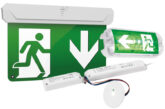
Andrew Wilson, Commercial Manager at Varilight, highlights some key points for electricians to consider before installing dimmable LED lighting.
With the miniaturisation of electronics, LED lamps increasingly resemble the incandescent and halogen lamps they are designed to replace. However, can they replicate dimming performance of older lighting technologies? In many cases they can, but a lack of information can lead to disappointing results and unwanted experimentation on-site.
By following a few simple rules, IT IS possible to get it right first time:
- Check the LED lamps are “dimmable”
It’s a common misconception that any LED lights can be dimmed with an LED dimmer. In reality, the driver circuitry must be designed with dimming in mind so it’s essential to choose lamps that the manufacturer describes as “dimmable”. The lack of an industry standard for dimmable LED drivers has, though, led to many different approaches by lamp manufacturers – some clearly more successful than others.
- Select recognised brands
There is a wide degree of variation in the dimming performance of “dimmable” LED lamps, with the achievable brightness range and stability of output being the most likely features to disappoint. Some manufacturers are happy to label their lamps as “dimmable” even if they can deliver only the slightest change in brightness.
We recommend that customers choose lamps from established lighting manufacturers for reliable dimming, better product warranties, longer lamp lifetimes and more customer support.
- Choose brighter lamps to get the most from the dimmer
To truly replicate the dimming performance of incandescent lighting it is important to choose LED lighting with a high lumen output. There is little point in connecting a dimmer to an LED light if it’s output is dim enough already.
- Check manufacturers recommendations
Most established lighting brands publish dimmer compatibility data on their websites. This data is a useful reference point and can help in choosing a dimmer. If in doubt, contact the company to ask about their recommendations.
- Avoid standard dimmers
Some brands of LED lighting may claim to be compatible with a standard dimmer but, even where some dimming is possible, is likely that the dimming range will be disappointing. It’s also worth remembering that standard dimmers will be under-loaded in most LED applications, exacerbating flicker and strobing effects, which in turn can drastically shorten lamp and dimmer lifetimes.
- Choose a dimmer designed for LED lighting
For the best performance choose a dimmer such as Varilight’s V-Pro LED dimmer, which has several dimming modes on board to enable smooth dimming across the diverse LED driver technologies in the market. The brightness output a lamp produces from the same power input varies markedly between brands. For this reason, all Varilight LED dimmers have adjustable minimum and maximum brightness settings to enable the user to access the full brightness capabilities of a given lamp or to avoid lamp instability at either end of the dimming range.
The on-board “drive” function can also be employed to deal with lamps that fail to illuminate when switched on by a dimmer set at a low brightness level. Once the settings have been optimised for a given load, they can be locked by the installer to prevent accidental re-programming during normal use.
- Select the dimmer before purchasing LED lighting
Design lighting installations to ensure they meet the minimum and maximum load requirements of the dimmers available. Splitting the load across more than one dimmer could provide a solution whilst giving greater control by allowing light levels to be zoned within a multi-functional space.
High-power V-Pro dimmers are now available, capable of handling up to 300W and Varilight’s V-Com series has options up to 600W. When controlling mixed loads Varilight recommends not exceeding the LED rating of the dimmer.
- Understand all the features of the dimmer
LED dimmers often come with features designed to enhance the performance of dimmable LED lighting but access to these features may require programming. For example, enhanced scene-setting features within our V-Pro IR remote control dimmers can be unlocked by using the dedicated “LightScene” handset.
For more information on Varilight dimmer switches visit: www.varilight.co.uk









